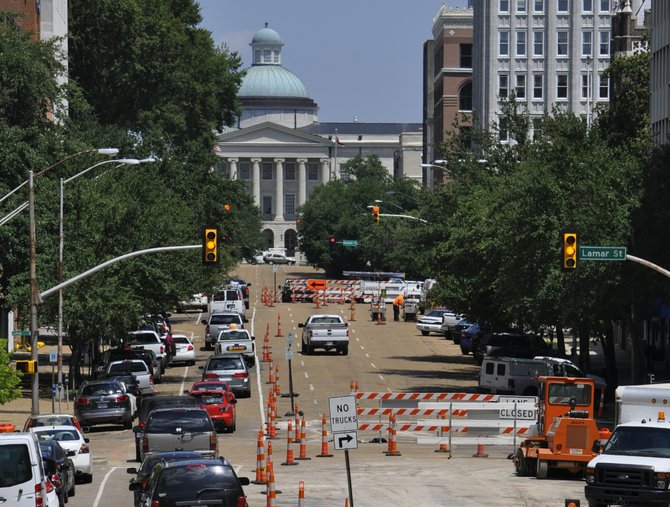Capitol Street is getting a facelift, but detractors say the project may not have the desired effect of higher commercial traffic. Photo by Trip Burns
The thinking behind the two-waying of Capitol Street is simple: If you slow down traffic around the once-thriving business district, foot traffic will increase, and drivers will be more likely to stop and shop.
The idea to overhaul downtown's centrally located corridor has been a pet project of Downtown Jackson Partners for years. The street was converted to one-way in the 1970s to provide quick egress for commuters headed out of town. In 2010, DJP President Ben Allen wrote on the organization's web site that "retail does not enjoy one way streets with cars whisking by."
Allen, speaking to the city council on Tuesday, said the DJP raised "100 percent" of the money for the Capitol Street renovation project, but according to DJP spokesman John Gomez, the city provided a 20 percent match ($702,518) for federal grants. Allen said the organization hired the lobbyists who went to Washington and secured nearly $4 million in federal funds. That number was later reduced when former Mayor Harvey Johnson Jr. diverted some of the money into fixing pipes after a 2010 freeze caused more than 150 pipes to burst across the city.
Gomez said the city also received money for the project through a Housing and Urban Development grant for more than $2 million.
Something ultimately must be done to help the once-thriving business district, which has seen some improvement since the re-opening of the historic King Edward Hotel in 2009, but not enough to attract more business. Critics say the ongoing $10 million renovation, which includes adding a bike path, giving the street a landscaping makeover and constructing four roundabouts (an addition to the plan added by the city, Gomez said) may not have the desired effect.
Mayor Chokwe Lumumba explained why his support for the project has been "non-existent or lukewarm."
"The idea behind it is that it will improve retail opportunities, because it will slow down traffic," Lumumba said last week. "I'm not sure that it is going to do that. (The project) is already established, and I'm the executive of the city, so I'm going to see it through to completion. We have to hope the people who had more confidence in the project when it was approved are right."
He is not alone in his skepticism.
Dr. Mukesh Kumar, associate professor of urban planning at Jackson State University, says what the downtown area needs is a complete network of streets to promote an alternative lifestyle—one that is not centered around getting into a car every day.
"Complete streets are exponentially enhanced in their value when they are part of an integrated system," Kumar said. "An improved strip of 0.7 miles is merely a curiosity and does not fundamentally shift urban living."
The promise of living in a downtown area, Kumar said, is that walking, biking or public transit can be the primary modes of transportation. The problem in downtown Jackson, he said, is that there are few places to live and not enough jobs to support a higher residential population.
"We have this chicken-and-egg scenario," Kumar said. "We have to have places for people to work and shop, but we (need) the people here so the businesses will come."
Lumumba said that's part of the reason he didn't support the project.
"I'm not sure what leverage we had to use the (federal and state) money for something else," Lumumba said. "We might have made the best decision at the time, given the circumstances. I just don't know that slowing down traffic is going to increase retail sales. Most people know what they are going to do when they come downtown."
The mayor pointed out that retail opportunities on the east end of Capitol Street have been on the rise the past two years since the historic King Edward Hotel reopened as a Hilton Garden Inn. He believes proposed projects like the Convention Center Hotel and the Westin Hotel will help keep people in the downtown area, and should improve the area's commercial possibilities.
Lumumba said he knows of one developer who is currently organizing its efforts to apply for tax-increment financing to build loft-style apartments across from the King Edward Hotel. As the JFP reported in April, BlackWhite Development bought a block of those buildings, partnering with New Orleans-based HRI Properties.
Officials expect the renovations to be complete by this time next year.
"Hopefully, the improvements, done properly, will start the renovations of more streets that, collectively, could make downtown living fundamentally different from a suburban existence," Kumar said.


